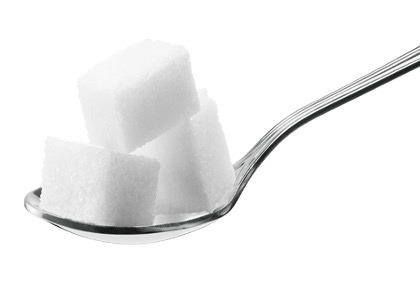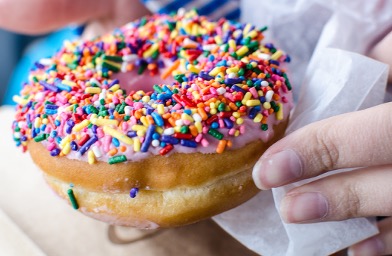Sugar addiction thread 1/18
The man or woman in the street might say ‘I’m addicted to chocolate’, for example. It seems broadly accepted by ‘the public’ that what we put in our mouths can lead to unwanted addictive behaviours with negative impacts on our health & wellbeing.
The man or woman in the street might say ‘I’m addicted to chocolate’, for example. It seems broadly accepted by ‘the public’ that what we put in our mouths can lead to unwanted addictive behaviours with negative impacts on our health & wellbeing.
2/18
Yet sugar addiction is not a formally recognised disorder unlike drug/alcohol use, nor is it seen as a process addiction like gambling, shopping or sex. Neither is it recognised as an eating disorder. The result is little research & no services to help people who struggle.
Yet sugar addiction is not a formally recognised disorder unlike drug/alcohol use, nor is it seen as a process addiction like gambling, shopping or sex. Neither is it recognised as an eating disorder. The result is little research & no services to help people who struggle.
3/18
I prefer the term sugar addiction and not food addiction. The evidence suggests that it is foods containing sugar or refined carbohydrates such as flour, often in combination with fat and salt, which are particularly problematic in terms of ‘moderation’.
I prefer the term sugar addiction and not food addiction. The evidence suggests that it is foods containing sugar or refined carbohydrates such as flour, often in combination with fat and salt, which are particularly problematic in terms of ‘moderation’.
4/18
Flour, pasta & other carbs are just glucose molecules & #39;holding hands& #39;, soon to become sugar in the body @lowcarbGP Your liver cannot tell the difference between the sugar in a Coke and the sugar in a glass of fruit juice or a slice of toast. https://youtu.be/dBnniua6-oM .">https://youtu.be/dBnniua6-...
Flour, pasta & other carbs are just glucose molecules & #39;holding hands& #39;, soon to become sugar in the body @lowcarbGP Your liver cannot tell the difference between the sugar in a Coke and the sugar in a glass of fruit juice or a slice of toast. https://youtu.be/dBnniua6-oM .">https://youtu.be/dBnniua6-...
5/18
Not all food is ‘addictive’. Certainly not whole, real foods such as eggs, fish, meat and non-starchy vegetables. We have to eat after all. The original human diet @KenDBerryMD
Snacks are designed to be hyperpalatable and moreish. Food as entertainment not nourishment.
Not all food is ‘addictive’. Certainly not whole, real foods such as eggs, fish, meat and non-starchy vegetables. We have to eat after all. The original human diet @KenDBerryMD
Snacks are designed to be hyperpalatable and moreish. Food as entertainment not nourishment.
6/18
@ASAMorg addiction = inability to abstain from substance at a cost to mental/physical health. ICD-10 ‘dependence’ = cravings, having more than intended & for longer, taking to manage withdrawal symptoms, needing ++ to get same effect, neglecting activities & clear harms
@ASAMorg addiction = inability to abstain from substance at a cost to mental/physical health. ICD-10 ‘dependence’ = cravings, having more than intended & for longer, taking to manage withdrawal symptoms, needing ++ to get same effect, neglecting activities & clear harms
7/18
Seems to apply to sugar, carbs & ultra-processed food? It certainly applied to me and many people I’ve spoken to about this. Just about everyone in our type 2 diabetes remission group endorsed experiencing these symptoms in the past. Addictive behaviours are hard to admit.
Seems to apply to sugar, carbs & ultra-processed food? It certainly applied to me and many people I’ve spoken to about this. Just about everyone in our type 2 diabetes remission group endorsed experiencing these symptoms in the past. Addictive behaviours are hard to admit.
8/18
Cravings that feel impossible to resist, despite having decided not to eat. Getting the shakes without sugary foods, eating +++ to feel & #39;satisfied& #39;. Preferring to eat alone. Being desperate to stop eating carbohydrate heavy foods but always going back. Out of control.
Cravings that feel impossible to resist, despite having decided not to eat. Getting the shakes without sugary foods, eating +++ to feel & #39;satisfied& #39;. Preferring to eat alone. Being desperate to stop eating carbohydrate heavy foods but always going back. Out of control.
9/18
Sugar (cf alcohol) is not addictive for all. @DrNicoleAvena has designed the Yale Food Addiction Scale. E.g. 8% might be addicted to food but higher in T2D. High scores linked to mental health problems and obesity. Relatives often have same/other addiction problems.
Sugar (cf alcohol) is not addictive for all. @DrNicoleAvena has designed the Yale Food Addiction Scale. E.g. 8% might be addicted to food but higher in T2D. High scores linked to mental health problems and obesity. Relatives often have same/other addiction problems.
10/18
A sugar addict’s early memories are often of sugary foods. This can interact with a difficult experience & become emotional management. The person develops fewer ‘healthy’ coping strategies for difficult emotions such as boredom, anxiety or sadness. @carbaddictiondr
A sugar addict’s early memories are often of sugary foods. This can interact with a difficult experience & become emotional management. The person develops fewer ‘healthy’ coping strategies for difficult emotions such as boredom, anxiety or sadness. @carbaddictiondr
11/18
Sugar triggers++dopamine in the brain. We are powerfully motivated to repeat this. Dopamine receptors down regulate in an attempt at balance. We need ++sugar to get the same effect. Also leads to more low mood & lack of motivation for other things over time See @JoanIfland
Sugar triggers++dopamine in the brain. We are powerfully motivated to repeat this. Dopamine receptors down regulate in an attempt at balance. We need ++sugar to get the same effect. Also leads to more low mood & lack of motivation for other things over time See @JoanIfland
12/18
Sugar triggers insulin release. Then tryptophan can cross blood/brain barrier & is converted into feel-good serotonin. Tryptophan depleted over time. Sugar makes you feel good in the short-term but is slowly robbing you of your well-being both mentally & physically.
Sugar triggers insulin release. Then tryptophan can cross blood/brain barrier & is converted into feel-good serotonin. Tryptophan depleted over time. Sugar makes you feel good in the short-term but is slowly robbing you of your well-being both mentally & physically.
13/18
Sugar & carbs override natural satiety signals. Protein & fat lead to natural satiety, the brain signals us to stop eating via the action of leptin. However, carbohydrates override this mechanism. That’s why people joke that they always have room for pudding. It’s true.
Sugar & carbs override natural satiety signals. Protein & fat lead to natural satiety, the brain signals us to stop eating via the action of leptin. However, carbohydrates override this mechanism. That’s why people joke that they always have room for pudding. It’s true.
14/18
When eating carbs in the autumn was a matter of life & death, this really mattered. Those of us alive today exist because our ancestors had the ability to over eat when it counted & survived the winter. These days, we live in a perpetual ‘autumn’. Sugary food always near by
When eating carbs in the autumn was a matter of life & death, this really mattered. Those of us alive today exist because our ancestors had the ability to over eat when it counted & survived the winter. These days, we live in a perpetual ‘autumn’. Sugary food always near by
15/18
What should we do? We have to eat. The answer is simple but not easy. As for alcohol, drug or nicotine addiction, the essential first step for recovery is abstinence. This is always sugar & refined carbohydrate. Not easy, but it is possible. Many of us have walked this path
What should we do? We have to eat. The answer is simple but not easy. As for alcohol, drug or nicotine addiction, the essential first step for recovery is abstinence. This is always sugar & refined carbohydrate. Not easy, but it is possible. Many of us have walked this path
16/17
Each person must work out their own trigger foods over time. What can you NOT moderate, that is the key thing to notice. I can bet it won’t be eggs, fish or broccoli! Your reward will be freedom from cravings, overeating, shame, low mood and illness.
Each person must work out their own trigger foods over time. What can you NOT moderate, that is the key thing to notice. I can bet it won’t be eggs, fish or broccoli! Your reward will be freedom from cravings, overeating, shame, low mood and illness.
17/18
Also part of long-term recovery is building up the feel-good transmitters dopamine & serotonin naturally, to avoid relapse. Exercise, hobbies, yoga, helping others, being outdoors etc can all help your mental health. Follow what makes you feel good. @actionhappiness
Also part of long-term recovery is building up the feel-good transmitters dopamine & serotonin naturally, to avoid relapse. Exercise, hobbies, yoga, helping others, being outdoors etc can all help your mental health. Follow what makes you feel good. @actionhappiness
18/18
Join the recovery tribe & get support & guidance. I recommend the Facebook group Sugar Bomb in your Brain https://www.facebook.com/groups/1682784168624569/">https://www.facebook.com/groups/16... . FF @BittenJonsson @TriggerFree_RD @FruehlingAnna @carbaddictiondr @DietDoctor Recovery is possible and it’s amazing!
Join the recovery tribe & get support & guidance. I recommend the Facebook group Sugar Bomb in your Brain https://www.facebook.com/groups/1682784168624569/">https://www.facebook.com/groups/16... . FF @BittenJonsson @TriggerFree_RD @FruehlingAnna @carbaddictiondr @DietDoctor Recovery is possible and it’s amazing!
This thread in more detail as a blog post for @appetite_doctor
https://theappetitedoctor.co.uk/2020/08/16/guest-blog-dr-jen-unwin-on-sugar-addiction/">https://theappetitedoctor.co.uk/2020/08/1...
https://theappetitedoctor.co.uk/2020/08/16/guest-blog-dr-jen-unwin-on-sugar-addiction/">https://theappetitedoctor.co.uk/2020/08/1...
Book out now! Ably assisted by @BittenJonsson @GeorgiaEdeMD @FruehlingAnna @TriggerFree_RD and @lowcarbGP my profits go to @PHCukorg
Fork in the Road: A Hopeful Guide to Food Freedom https://www.amazon.co.uk/dp/B08XX4ZH3F/ref=cm_sw_r_cp_api_fabc_9D1VY7K2QXCM8H4XGG6X">https://www.amazon.co.uk/dp/B08XX4...
Fork in the Road: A Hopeful Guide to Food Freedom https://www.amazon.co.uk/dp/B08XX4ZH3F/ref=cm_sw_r_cp_api_fabc_9D1VY7K2QXCM8H4XGG6X">https://www.amazon.co.uk/dp/B08XX4...

 Read on Twitter
Read on Twitter




